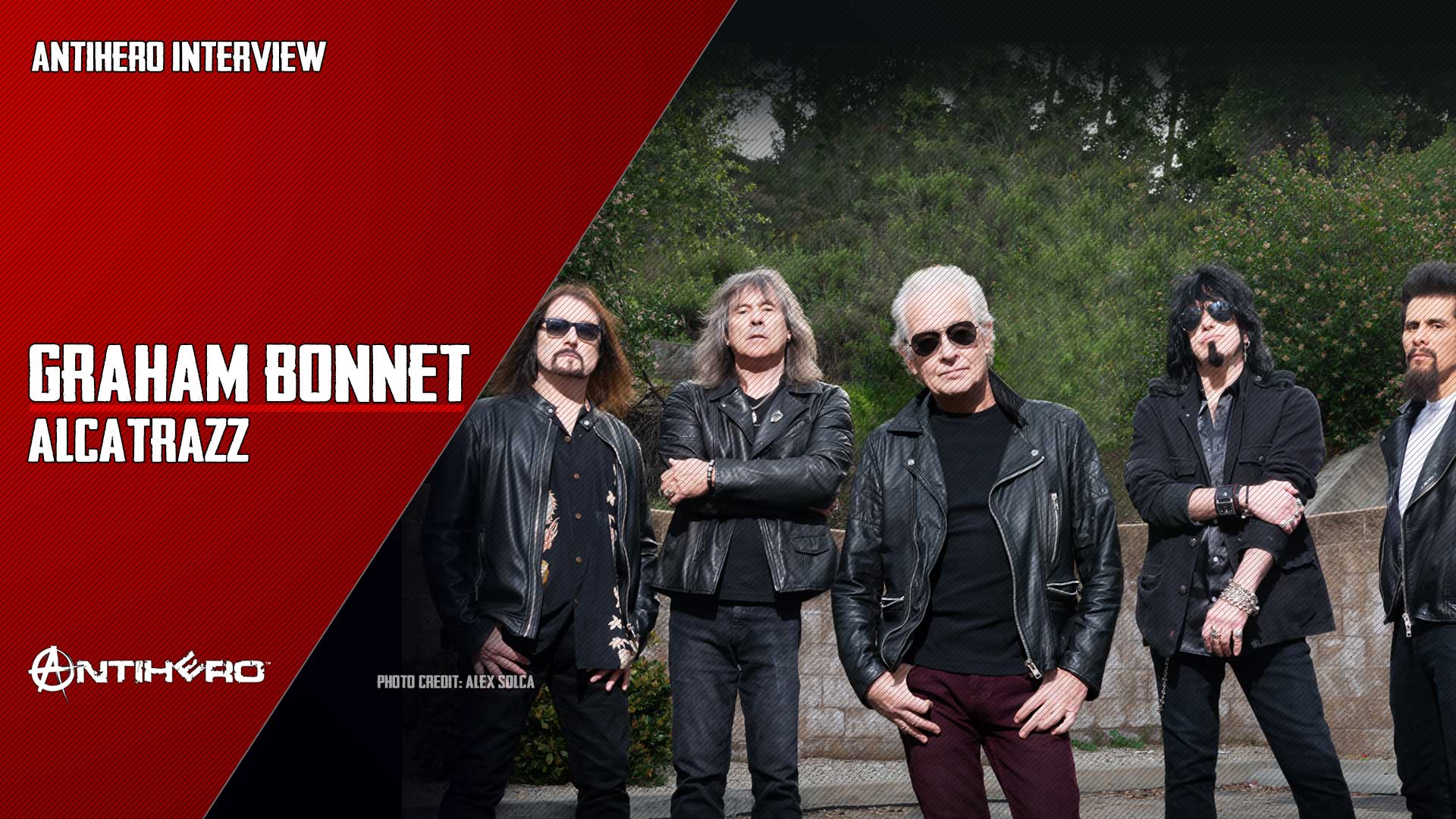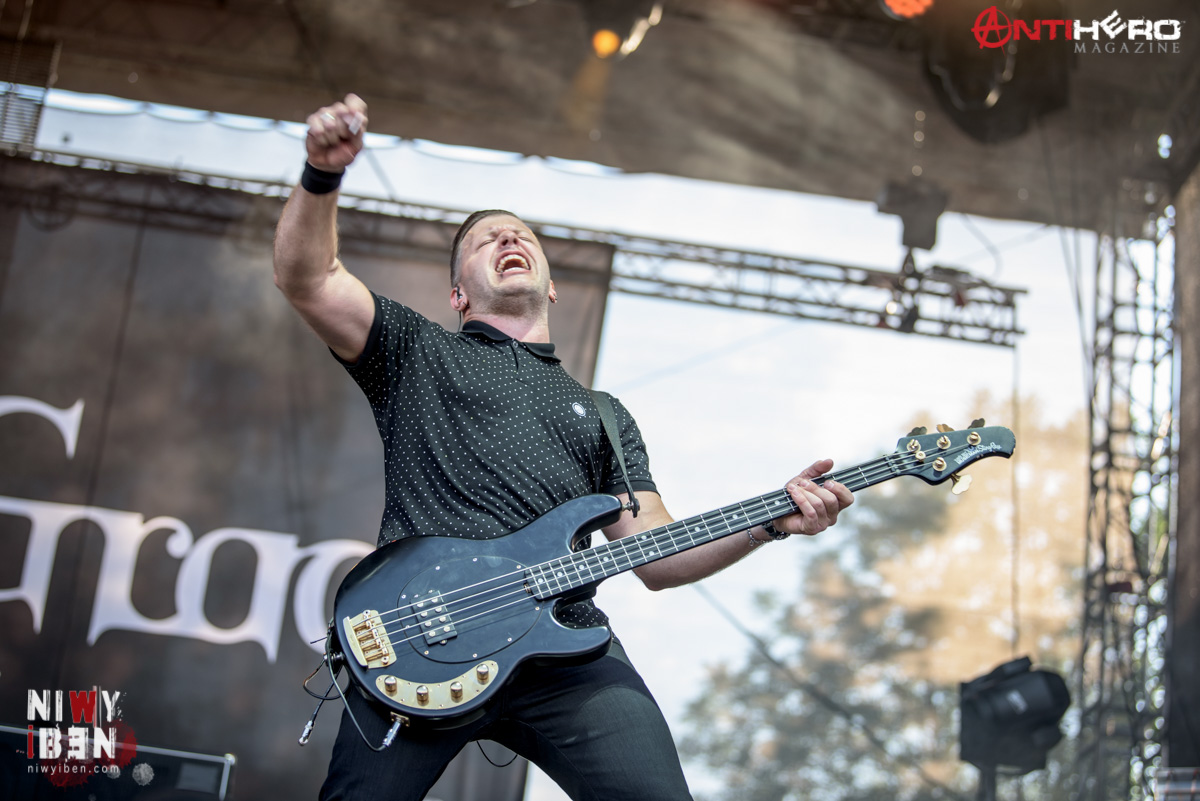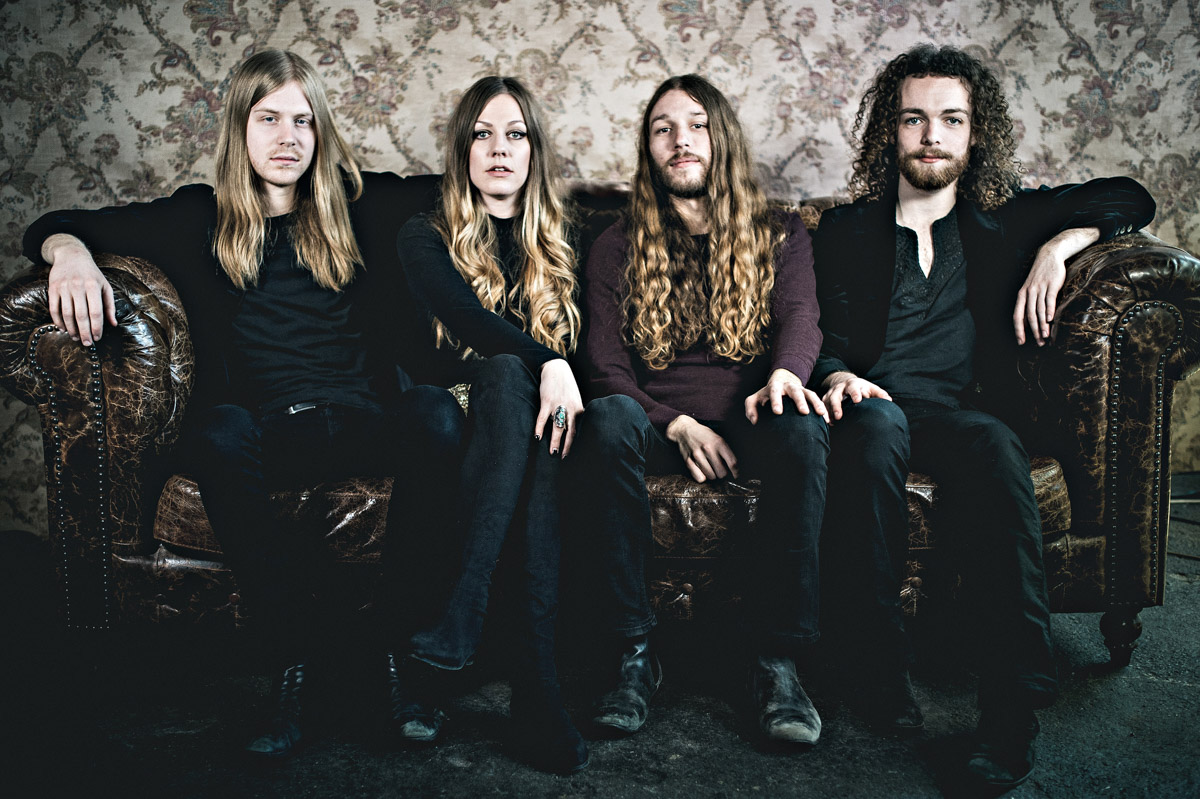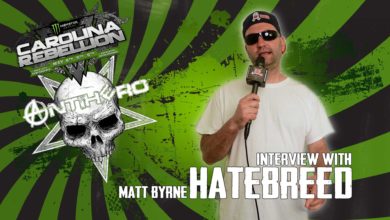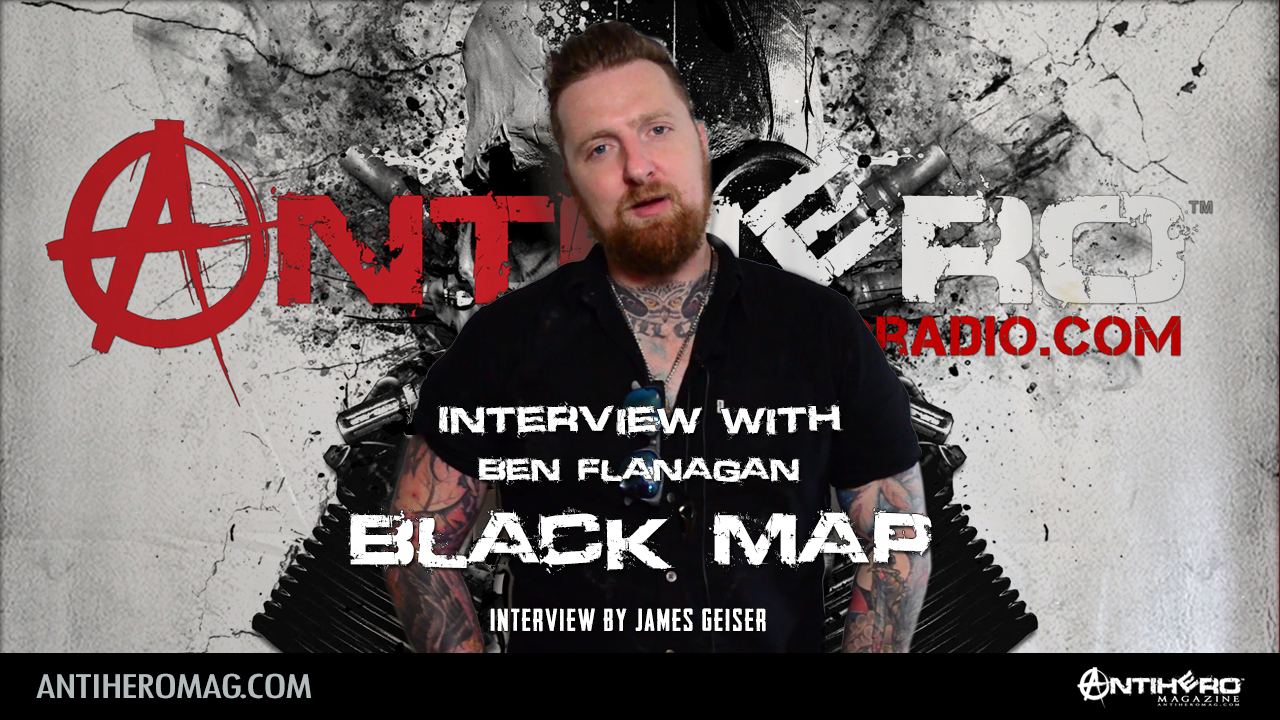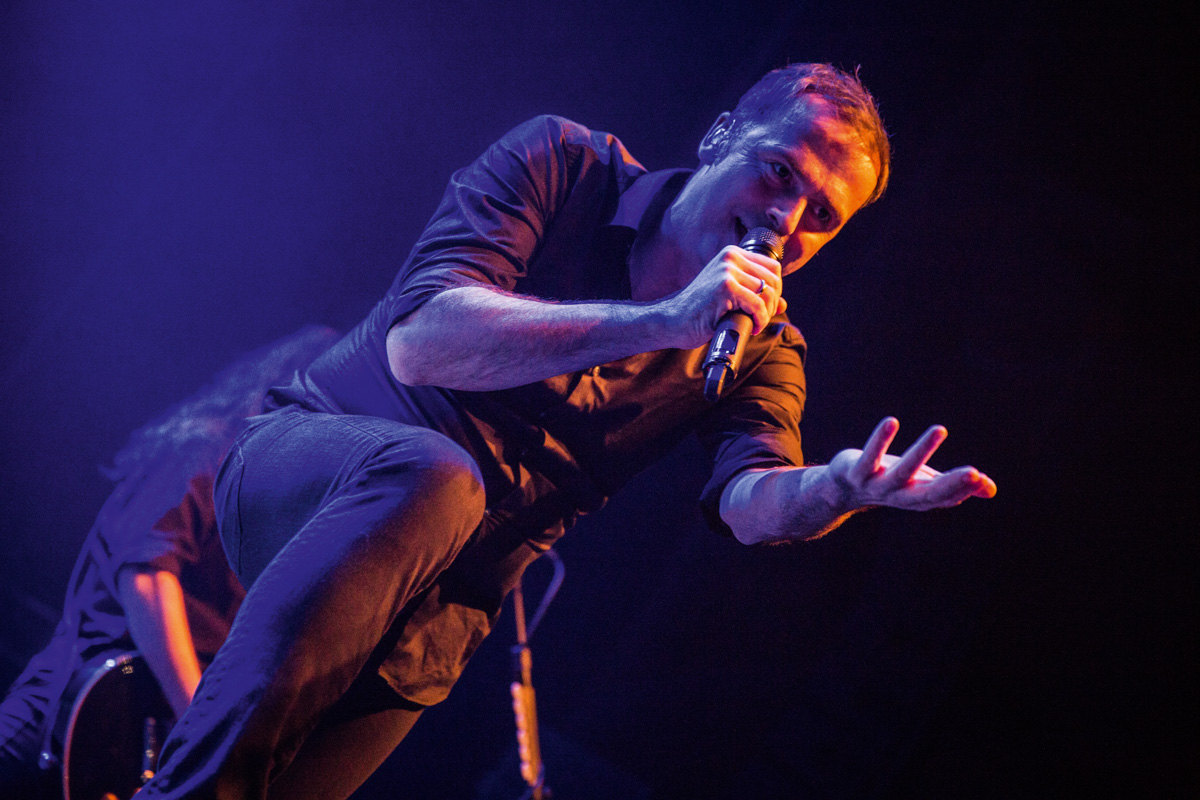 The hard-hitting, melodic heavy metal band ALCATRAZZ will once again throw down a studio gauntlet on July 31st with Born Innocent, their first studio venture since 1986’s Dangerous Games. Alongside the unique vocal prowess and range of star frontman and founding member GRAHAM BONNET, Born Innocent also features fellow founding members JIMMY WALDO and GARY SHEA. And from the classic album art, featuring the mighty rock itself, Born Innocent is a journey into the sort of heavy, melodic and supremely articulated hard rock that is a cornerstone of the likes of RAINBOW and the MICHAEL SCHENKER GROUP, territory ALCATRAZZ successfully strode in the ‘80s before going on hiatus.
The hard-hitting, melodic heavy metal band ALCATRAZZ will once again throw down a studio gauntlet on July 31st with Born Innocent, their first studio venture since 1986’s Dangerous Games. Alongside the unique vocal prowess and range of star frontman and founding member GRAHAM BONNET, Born Innocent also features fellow founding members JIMMY WALDO and GARY SHEA. And from the classic album art, featuring the mighty rock itself, Born Innocent is a journey into the sort of heavy, melodic and supremely articulated hard rock that is a cornerstone of the likes of RAINBOW and the MICHAEL SCHENKER GROUP, territory ALCATRAZZ successfully strode in the ‘80s before going on hiatus.
Debuting on Born Innocent is the latest of the illustrious ALCATRAZZ guitarists to bring their extreme six-string talents to the band, with Boston-based Berklee College of Music Assistant Professor of Guitar, and one-man metal impresario JOE STUMP perhaps proving the finest of a list which includes the likes of YNGWIE MALMSTEEN and STEVE VAI.
“The name Alcatrazz is a brand name,” announces star frontman and founding member GRAHAM BONNET. “People know what Alcatrazz delivers, and on this album you have the original ideas of Alcatrazz but played in a modern way with new inspiration.”
I had the opportunity to have my third chat with Graham as he escaped briefly from Alcatrazz to discuss their new album.
ANTIHERO: I just wondered how you’re coping. How are you coping with what’s happening in the world right now? Beth has said you were doing some recording.
Graham Bonnet: Yeah, it’s a little bit funny because everybody has stopped working, as you know, and so people are wondering what the hell is going to happen next, especially with concerts and things, because what can you do without an audience? I saw that Keith Urban did a thing on them on TV to show and he did a concert, which is kind of a cool idea. It’s like a drive in at a movie rather than you know, a show.
So, people stay within the car. And have little speakers, I guess.
I thought, what a great idea. I don’t think anybody else has kind of followed up on that idea, though, because there were warnings about doing that. Of course. I’m not quite sure what they were- But I thought that was doing the perfect thing.
ANTIHERO: So, what recording are you doing today? Are you doing some new material that you’ve written recently?
Graham Bonnet: Yeah, we’re doing some new songs with our old guitar player Conrad Pesinato and just doing something different because we have to So we are actually doing two different records. With Beth myself and Conrad.
And whoever else, I’m not quite sure yet who else will be playing on it yet.I have also been playing lots of guitar solos because of course I used to play guitar on my early records.
Yeah. And that’s what we’re going to be doing now. So today we’re going to be doing a mix of new music with Conrad and he is coming over this afternoon. I’m looking forward to that because it’s to get away from the old routine of it’s got to be heavy and everything has to be all of the same,with the same feel to it. I can do, you know, Rnb or blues or rocking also. But I’ve got more freedom, you know.
ANTIHERO: Moving on as well of course you have also got a new Alcatraz album due to be released at the end of July. I just wondered what prompted the decision to bring back the Alcatrazz name. I mean, I know you were going around a few in the last few years as the Graham Bonnet Band, and then it became Alcatrazz. I just wondered why the reintroduction of the Alcatrazz name?
Graham Bonnet: Well, because I don’t think people know who Graham Bonnet is…I don’t know who I am sometimes.
And because we were playing as the Graham Bonnet band, we decided that maybe attract more customers using the Alcatraz name because some people kind of know Alcatrazz more than me in certain countries. So, we thought of doing that. Yes. So, we tried that out. And actually, it didn’t work that great to be honest with you.
In some places, yes. Some parts of Europe and of course, in Japan, where the band is still pretty well respected. Which is OK. So we need to cover the rest of the world if we can. And we love playing in Ireland, Scotland and everywhere.
But we just have one certain little area that we can’t escape and that’s Japan and the rest of Europe. But we’re trying. We’re trying to get a broader audience. Basically, with using the name .It works a little bit, but not to a great extent.
ANTIHERO: Beth was for a brief period actually playing in Alcatrazz Now you’ve got Gary Shea back in the band again. Just wondered why that transition, why that change of band personnel.
Beth: I have elderly parents that are sort of in decline. After the last tour I was commuting, I was flying to where they live every 10 days or so, it was looking like there was no way that I would be able to continue So I had to leave to take care of family.
Gary seemed like an obvious choice. He was an original member and he didn’t really have anything going on at the time. So, keeping it in the family.
Graham Bonnet: Yeah. You know, I definitely didn’t want Beth to leave because I think she was a great asset to the band she really was We got into a different kind of a crowd of girls, for instance, instead of all guys, you know, with tattoos and big fat bellies(laughs)
But it’s very difficult these days to play this kind of music, which isn’t exactly fashionable right now, and make it look as though you’re being honest about what you’re playing. Because I’ve been doing this since I was 30 years old and its getting a little bit tedious now.
And I don’t mean that to sound horrible. Or I don’t like this music. I do like performing it. But it’s time to do something else as well. but everyone else is doing, especially when nobody’s going to work anymore. They’re planning on like, what’s gonna happen next. It’s just going to be here all year. We’re going to play this year. I wouldn’t play next year. Nobody knows. So to do something else is what everybody is doing. Our keyboard player is in another band ,and he also has his own band in New England .So he is in three different bands. So we have to make money,but right now it’s really hard. What we are doing here is- I am doing sessions.I don’t know what everyone else is doing because we don’t all live in the same town.
So, it’s like, oh, what the hell are we going to do? I did a session the other day like a live jam session. With some of the guys from the Cult. We did some Michael Schenker, “Assault Attack”, that song. We did it so-called live. Everybody in their own homes and then pull everybody up on screens, you know, little squares or whatever.
Yeah, that’s what people are doing. And I believe that Gene Simmons is monetizing it now. Which, of course he would. There’s some Kiss stuff out there. But you have to pay to see it.
ANTIHERO: Just to return then to the new Alcatrazz album and the first single off it-Polar Bear It touches on a subject that you wouldn’t sort of get on a typical rock or hard rock album. I just wondered in terms of choosing subject matter for songs do you like to think outside the box. I mean, you’ve also got Fin McCool on there, for example.
Graham Bonnet: The song is actually pretty heavy and not actually about The Polar Bear You know,it’s about the Eskimo-its about the guy being too old to hunt Everything about the guy being through tough times he’s old and hes not able to eat as all his teeth have gone.
This is to go back in the days of igloos. The elder of the tribe , if he were really, you know, disintegrating, you were out into the snow and just waited for the polar bear to come and get him. . And that was their god-their spiritual leader so to speak-that’s what those men actually did.
ANTIHERO: And then there is also Finn MacCool… Obviously, that’s Irish,an Irish legend. Do you do a lot of reading in terms of subject matter and stuff?
Graham Bonnet: You know who Finn MacCool is, don’t you?
ANTIHERO: Originally from N.Ireland so, yes, I am fully familiar with the story.
Graham Bonnet: Yeah. It was something that I thought was a good story. I was kind of sort of stuck for an idea one day, and then I thought about some of my friends in London. They had a band called Finn MacCool. That’s a great name, isn’t it? And I thought, but there’s a story behind that name. So I kind of checked it out again after all these years. I’m talking about 1970 when my friends were called Finn MacCool. As I researched it a little bit, I kind of knew the story about the Giant’s Causeway and all that thing, from Scotland to Ireland or Ireland to Scotland. It’s still there and you can see it to this very day even though it may not be what we think it is. I think it’s a volcanic formation. I think they’re hexagons or whatever the hell they are, octagons. I think they’re hexagons, the actual bricks on the road. Yeah. Is it hexagons, is it? Hexagons?
ANTIHERO: I think so, yeah.
Graham Bonnet: I’m not quite sure, but you know what I mean. And it’s still there to this day. It’s something that tourists go and see. So I thought I’ll just make up something about why it’s there and who one of the builders was. But it’s a cool story, you know because that’s a giant supposedly 10 feet tall or 12 feet tall and he had a battle with the guy in Scotland, but I can’t think of the name of him right now. There was all this confrontation between the two of them and so one day they decided to fight on the Giant’s Causeway, which they built as individual countries. :
So, they went out there and Finn MacCool was walking up to this other guy from Scotland and he’s like four or five feet taller than him, so he retreats, goes back to Ireland. He goes up to his wife and says “Please hide me. This guy is going to kill me.” So what he did, he got into a bath and his wife said “Let me cover you up with a sheet and I’ll say that that’s my baby in the bath to the other guy.” So he comes in, the taller giant, and he says to the lady “Where’s Finn MacCool? Where is he?” She says “Well, he’s not here at the moment, but my child’s in the bath, taking a bath at the moment.” The bigger giant looks in the bath and sees this huge baby and thinks well if that’s his baby, he must be fucking tall. So he retreated too so the battle never happened. It’s kind of a funny story but it’s so not true. I mean I know it’s not but it was just a cool fable or whatever.
ANTIHERO: Just again, regarding the album, you’ve quite a few musical guests on there. Was that something that you had a list of who you wanted to be on the album and you contacted them?
Graham Bonnet: Yeah, many people had probably been involved with the early Alcatrazz stuff, like Steve Vai for one. We tried getting Yngwie Malmsteen to play anything, he wouldn’t do it. But Steve wrote a song for us. He didn’t play on the album but played his part that he sent in on tape or something. He sounds like Steve Vai, he’s amazing.
So, Steve Vai and then there was Chris Impellitari, he wrote one. And of course our friend that just died Bob Kulick He wrote two with me. And I can’t believe he’s gone actually, it’s just so weird to talk about him in the past tense.I was talking about him to somebody and then somebody got in touch with me to say Bob’s died. What? How? I don’t know what happened to him.
So, we had all these different players to make the album a little more interesting probably.and so they were pretty good songs I think.
ANTIHERO: Of course, you worked with both Chris Impellitari and Bob in other musical projects. So were those an easy continuation of the long standing relationships that you’ve had over the years with those guys?
Graham Bonnet: Yeah. When we played in Japan, after we’d done our show in Tokyo, I think it was, Chris was playing in another band and we did Stand in line. He was really happy because they were very tired that night, but so was I after doing a gig. I said to them, “It’s not going to be very good, I’m knackered.” Anyway, we did it and the audience rose. It was great for my ego, it was fucking great. They all rose up onto their feet and clapped and I walked on stage. So I played with the audience for a little bit because I was “I want to go home.” But it was very successful and Chris was very happy.
ANTIHERO: You mentioned Bob. I just wondered; I mean obviously you played with Bob in Blackthorne. What were your abiding memories of Bob? How did you first meet?
Graham Bonnet: I was living in Australia at the time and doing sort of club gigs for the band out there, playing Rainbow or Alcatrazz or anything I liked really because I had a couple of hits out there just by myself. Sold a lot of albums and solo singles and stuff. So I had quite a good choice of songs there. I think Jimmy Waldo called me up. He said “What are you doing?” I said “I’m gigging around Australia.” He said, “What the hell are you doing there?” It’s because my ex-wife was Adelaidian, from Adelaide and so we moved there because our band fell to pieces, you know Alcatrazz et cetera
So, I said, “Well, I’ve got to do something,” and he said, “Well, how about coming to put a band together with me and this guy called Bob Kulick.” I said “Who is he?”He had worked with a lot of people, Michael Bolton, Diana Ross, Kiss, he had played with. I thought well, why not? So I got over there and met up with Bob and Jimmy at the airport and we went on from there to do demos almost every day. Because now there’s a second album from Blackthorne, which I’d forgotten about completely because we just demoed songs all over the place. So a second album was put together.
It was quite a meeting and I was very impressed with Bob’s ways. He’s an incredible musician. He was a…well he’s an incredible musician, absolutely.
ANTIHERO: The Alcatrazz album it’s listed as 13 tracks, but there’s actually 14 on there. There is the last track for Tony. I just wondered if there is any reason why it wasn’t listed in the regular album press release?
Graham Bonnet: Well that’s the song for my brother, my brother Tony. I’ve lost two people to Alzheimer’s, dementia: my dad and now my brother as well five years ago. Obviously it broke my heart and I had to write a song for him that was honest and not just soppy sentimental. I made up this song and it took…I just did it in one take, I couldn’t sing it twice. It just made it cry because I miss him and I love him very much. I’ve been to his grave a couple of times with family. It’s very touching because they have a tree planted at the head of his grave site and the tree takes all the nutrients from the earth of which my brother is one. The thing they put in the ground is biodegradable or whatever so it grows into the tree. My brother is part of that tree.
ANTIHERO: So, he’s living on. That’s nice.
Graham Bonnet: Yeah, it’s very hard to sing, I don’t think I could sing it. I’d probably have to do it line by line probably. But anyway, I did it in one take and I said I can’t do it again. I couldn’t. I was just too upset. It’s turned out okay I think, my tribute.
ANTIHERO: It’s a beautiful thing.
Graham Bonnet: He was my hero. He had the image I always wanted; he was a Teddy Boy in the 1950s. He had that style I loved and I kind of missed out on until I grew up and started to wear those kinds of clothes again, the 1950s gear, suits and the whatevers and the bent back hairstyle.
ANTIHERO: I read quite some time ago that you said hard rock music wasn’t something that came naturally to you as a vocalist.
Graham Bonnet: Yeah.
ANTIHERO: Here you are in 2020, 41 years after that Rainbow album that you released with them and you’re still doing it.
Graham Bonnet: I know. I’m stuck in that style of music. I never, ever thought I’d be in a band like Rainbow, which is basically Deep Purple-ish. Then I got a call and I was asked to come over to audition for the band. And I went over. I learnt the song called Mistreated. I didn’t know Rainbow from…I didn’t know who the hell they were, no idea, sounds like a punk group, Rainbow.
So anyway, I did the audition and they gave me the job basically that very day I went over and sang for them. I was very happy that it did happen because it changed my life completely. I had a new look at some different kind of music that I’d never played before, never dreamed of playing before. ] rock songs and stuff when I was a kid in my band because like you do when you’re a kid, you play in pubs and do other stuff. That’s what I was doing, so I knew what to do, I think. But I learned a lot from Roger and from everybody in that band because the musicianship was just incredible. I just stood back in amazement when they started to play this Mistreated song. It was just wow. The sound was just incredible and the keyboard player, Don, what an amazing player. Ritchie, say no more, Roger, fucking great bass player, and of course, Cozy Powell. That was the best band I’ve ever seen in rehearsal. At that time I was just blown away. So I had to take the job even though I thought I was wrong
I went back home to London. At that time, that’s where I was living. I had to say to my manager, “I’m not right for this, these guys have got long hair and Spandex and whatever, I look totally wrong. But they’ve given me the job, what do I do?” He said “You better do it because I think it would be good for you..” Because I found out later I lost a lot of fucking money from playing in that band. I didn’t see very much at all. When I spoke to Ronnie, he asked me if I was paid anything from Rainbow like at the end of the year. I said “No, I didn’t.” Sad”I was really ripped off ” I said I think that’s what happened to me. I don’t like telling tales out of school and all that, but it’s just very, very disappointing and one of the reasons I left the band. I just thought, hang on, something’s wrong here.
ANTIHERO: You mentioned earlier that you’re actually working on two albums now. Do you think you’re now at a creative peak in your career? Surely you should be sort of taking things a little bit at a slower pace.
Graham Bonnet: Me? No. That doesn’t happen much. I really got out of bed this morning, I’m playing my guitar thinking about what we’re going to do for the next two albums. When we play on stage I’m not a dead person up here. I’m a pretty aggressive singer. I have to keep up my health as much as I can even though last year I had back surgery, it’s really affected me quite a lot. I have a little bit of pain in my back but apart from that I’m okay. I’m still fairly strong, but I have to get back on my bicycle and strengthen myself up a bit, especially my back and my legs. But I’m okay, I’m not like in a wheelchair or anything. It’s just to get back my normal, Mr. Average, strength.
It definitely is hard, especially when we did 26 shows in 21…no, 26 days and 21 shows, the last shows we did. Each show is almost two and a half hours, and I’m telling you that’s 20 something songs, 21 songs, I believe. And it’s like no solos-, no guitar solo bits, all the lot. No keyboards or bass solo so I was pretty much on all the time. It was difficult. That’s a lot of fricking songs and that’s a long time on stage to be singing. Looking back at that, that should have never happened. We shouldn’t have done that long. It’s ridiculous. After a while you get argh, you can’t sing anymore.
ANTIHERO: I was talking more as a long term fan there. Look after yourself more so than I want you to stop.
Graham Bonnet: Yeah, well I mean I’m hoping to stay around for a lot longer. I’m going to try to. If I can reach about 130 ‘ll be very happy. I try to look after myself even though sometimes I let myself down with not really caring especially when this virus thing happened. I swear to god, I have to tell you I got really ill one day and I realised because I did get ill, I’d had some brandy, I’d been pretty good, go 10 years then I suddenly let myself down by drinking again because of things that were going on within the band and coming back home and thinking oh my god, what am I going to do? Now this is happening. All I could hear on TV was people over 60 are very vulnerable to this fucking virus [so I knocked back some fucking brandy to calm my nerves because I was scared. Literally very, very scared.
It seems to have calmed down now a little bit now because of this new thing that’s going on now. This poor man that was murdered in the street on TV. That’s kind of taken people’s focus away from this virus. But I mean crowds of people, 100s, 1000s of people all shoulder to shoulder some not wearing masks, all that kind of thing. That’s going to kill somebody. Somebody’s going to die from manslaughter from one of those people because they are going to pass the virus on.
ANTIHERO: Yeah, exactly.
Graham Bonnet: You know what I mean. I’ve done nothing. All my family, everybody I know is fine you know what I mean. They’re not thinking like other people. The reason for wearing masks is not for yourself, it’s so you don’t spread to somebody else
They just forget about it. I have seen somebody else having a pool party, there were like 100s of people at this pool party, all jumping in. Man, I’m telling you probably half of that crowd is ill now.
Sorry, went on a bit there.
ANTIHERO: You’re alright. Just a final one. In conclusion, what would be the most important life lesson that a career in a music industry has taught you? What have you learned? What has been the thing that stands out for you the most?
Graham Bonnet: In one sense don’t trust anybody and never be a friend of your manager, that’s another thing. Never make a friend of anybody who’s into those circles because they will let you down. That’s said about Ronnie and me with the Rainbow thing. I believed every fucking word they said to me. That is one of the main things. If you go into the music business now I think the music business is pretty dead at the moment because everybody’s not doing anything. I don’t know how much longer it’s going to be before we actually are able to play live anywhere.
I would say to any kid really think about it. I know everybody likes to sing and play guitar and all that stuff, but it’s a dangerous rip-off world and you’ll be ripped off royally like I was from the age of 18, when I was with the management organisation years ago. I was promised everything I wanted and kept completely in the dark. Never asked me how much did I make this year? Oh, the song at number three in the chart, what do we get from that? What did we earn from that? Literally nothing.
My cousin and I were in the Marbles back in 1958. We were so green, it was sad because you had two young boys being taken for a freaking ride. So that’s what I can say, be very, very careful. There are lots of lying, good actors out there who pretend to be what they’re really not. I’ve met millions of them over the years. So beware!
ANTIHERO: Right Graham, that’s great. Thank you very much. I’ll let you get on with the rest of your day. Thank you very much for talking. Cheers.
Graham Bonnet: Very welcome, man.

